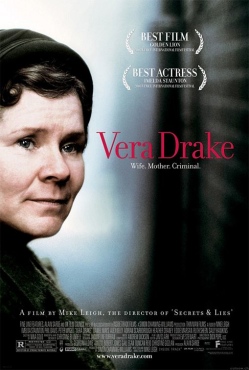Vera Drake
| Vera Drake | |
|---|---|

Theatrical release poster
|
|
| Directed by | Mike Leigh |
| Produced by | Simon Channing Williams |
| Written by | Mike Leigh |
| Starring | |
| Music by | Andrew Dickson |
| Cinematography | Dick Pope |
| Edited by | Jim Clark |
|
Production
company |
|
| Distributed by |
Momentum Pictures (UK) Fine Line Features (US) |
|
Release date
|
6 September 2004 (Venice Film Festival) |
|
Running time
|
125 minutes |
| Country | United Kingdom |
| Language | English |
| Budget | $11 million |
| Box office | $13.3 million |
Vera Drake is a 2004 British drama film written and directed by Mike Leigh and starring Imelda Staunton, Phil Davis, Daniel Mays and Eddie Marsan. It tells the story of a working-class woman in London in 1950 who performs illegal abortions. It won the Golden Lion at the Venice Film Festival and it was nominated for three Academy Awards and won three BAFTAs.
Vera Drake (Imelda Staunton) is devoted to her family, looking after her husband and children, her elderly mother, and a sick neighbour. Her shy daughter, Ethel (Alex Kelly), works in a lightbulb factory, and her son, Sid (Daniel Mays), tailors men's suits. Her husband, Stanley (Phil Davis), is a car mechanic. Although Vera and her family are poor, their strong family bonds hold them together. During her working day as a house cleaner, Vera performs constant small acts of kindness for the many people she encounters.
She is a kindly person who is eager to help others. Unknown to her family, she also works secretly, providing young women abortions. She receives no money for providing this service because she believes that her help is an act of charity to women in trouble. However, her partner Lily (Ruth Sheen), who also carries on a black-market trade in scarce postwar foodstuffs, charges two guineas (two pounds and two shillings: equivalent to £62 in 2015) for arranging the abortions, without Vera's knowledge.
The film also contains a subplot about an upper-class young woman, Susan (Sally Hawkins), the daughter of one of Vera's employers. Susan is raped by a suitor, becomes pregnant, and asks a friend to put her in contact with a doctor, through whom she can obtain an abortion. The doctor refers her to a psychiatrist, who prompts her to answer questions in a certain way, so that he can legally recommend an abortion on therapeutic psychiatric grounds: that she has a family history of mental illness and that she may commit suicide if not allowed to terminate the pregnancy. The abortion costs her a hundred guineas.
...
Wikipedia
